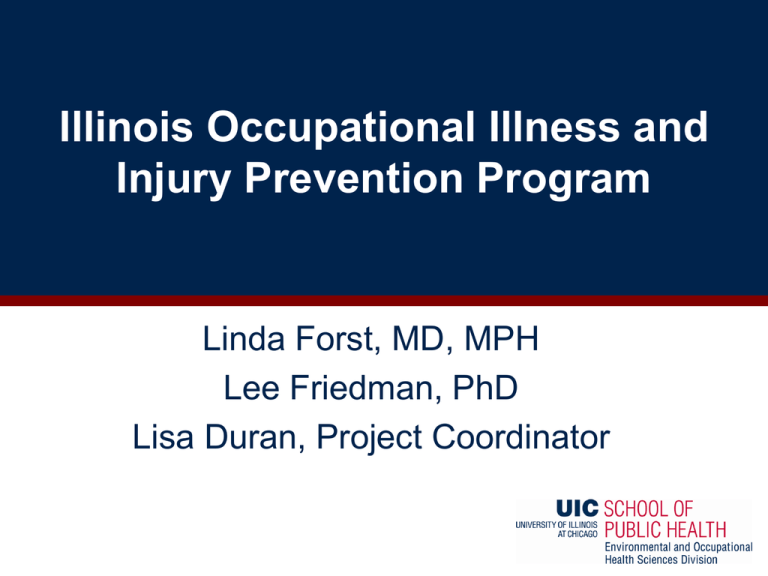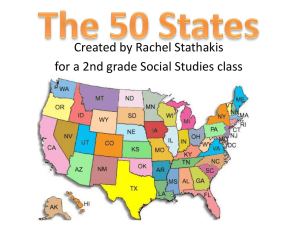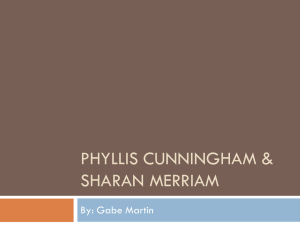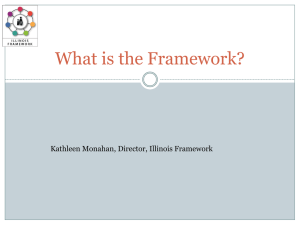here. - Illinois Center for Injury Prevention
advertisement

Illinois Occupational Illness and Injury Prevention Program Linda Forst, MD, MPH Lee Friedman, PhD Lisa Duran, Project Coordinator Occupational Health • Working people drive our economy • Working conditions can adversely affect health • Occupational health problems have substantial human and economic costs • Occupational illnesses and injuries are preventable Potential Role of Public Health • Enforcement agencies: OSHA and IDOL] • Investigations of workplaces: drive changes in safety & health policy/practice • Analyses of health related datasets: identify adverse conditions & injury sentinels • Consider/reach vulnerable populations (immigrants, teens, small businesses) • Integrate activities with other agencies Goal today • Increase awareness of occupational health—current and potential efforts--in Illinois • Discuss gaps and opportunities for collaboration between IDPH, UIC-SPH, other agencies and non-profits in the State • Reduce workplace injuries and illnesses • Improve the health the of working public Illinois • • • • • 12.9 million people 5th most populous state ~6 million employed 65% of pop is aged 18-64 Largest cities • • • • Chicago (3 million) Aurora (180,000) Rockford (156,000) Joliet, Naperville, Peoria Illinois: % Employment by Economic Sector, October 2012 Agriculture, 5.6 Other, 7.5 Manufacturing , 9.9 Construction, Mining, 0.2 3.1 Services, 41.3 Government, 13.7 Trade/transpo rt/utilities, 18.7 Number of Non -Fatal Injuries Estimated total number of non-fatal work related injuries and illnesses. Illinois, 1998-2009. Bureau of Labor Statistics. IDPH Occupational Disease Registry collects this. Rate of non-fatal work-related injuries and illnesses reported by private sector employers. Illinois and U.S., 2000-2007. Rate per 100 FTEs 7 6 5 4 3 2 1 0 Ilinois 2000 6.2 2001 5.6 2002 5 2003 4.6 2004 4.4 2005 4.1 2006 4.1 2007 3.8 US 6.1 5.7 5.3 5 4.8 4.6 4.4 4.2 Work-related fatal injuries. Illinois, 1998-2009. 250 Number 200 150 100 50 0 Bureau of Labor Statistics. IDPH Occupational Disease Registry collects this. Rate of fatal work-related injury and illness. Illinois, California and Michigan 2000-2007. IL 6 Per 100,000 FTE 5 4 3 2 1 0 2000 2001 2002 2003 2004 2005 2006 2007 CA MI Illinois Occupational Injury and Illness Prevention Program (IOIPP) • Successful application to CDC/NIOSH*, begun in July 2010 “Fundamental State-Based Surveillance” • UIC-SPH-EOHS - bona fide agent of IDPH • Established interagency agreements to get data • UIC-SPH + IDPH • UIC-SPH + IWCC *Grant# 5U60OH009850 Goal of IOIPP Prevent workplace injuries and illnesses in the State • • • • Assemble CSTE Occ Health Indicators (20) Use state databases for occup surveillance Provide analyses to target interventions Partner with stakeholders to implement preventive measures Statewide Databases • • • • Trauma registry--IDPH EMS Prehospital--IDPH Hospital Discharge data—IHAU of I Hospital Outpatient Discharge data (collection in IL begun in 2009)-- IHAU of I Hospital • Poison Center Data—Illinois Poison Center • First Reports of Occup Injury/Illness--IWCC • Workers compensation claims--IWCC Reports Report to Illinois CMS and AG Invited Presentations • Occupational Amputations in Illinois [ invited lecture at conference sponsored by NIOSH and BLS: Putting Workers Compensation Data to Use; June 2012; also presented to the Illinois Department of Labor and to Illinois Workers Compensation Commission, separately] • Data Linkage in Occupational Health [presented at Workers Compensation Data Usage summit sponsored by NIOSH/BLS; June 2009] Stakeholders Group • IDPH (Jayneece BostwickVan Trinh Nguyen) • IDOL (Cheryl Neff) • IWCC (Sue Piha) • OSHA Calumet City (Gary Anderson) • OSHA DesPlaines Office (Diane Turek) • OSHA Region 5 (Michael ConnorsNick Walters) • Cook County Bureau of Health Services (Linda Murray) • Stroger Hospital (Anne Krantz) • Interfaith Worker Justice (Kim Bobo) • Arise Chicago (Adam Kader) • Latino Union (Eric Rodriguez) • UIC Faculty (Lee Friedman, Linda Forst, Sherry BrandtRauf) • UIC Students (Lisa Duran, Peter Ruestow, Colin Krupczak) Stakeholders Meetings • Spring 2011: Ethics of data from Trauma Registry with OSHA to trigger investigations • Fall 2012: Amputations in Illinois Service to Illinois: IDPH • • • • • Cleaned entire Trauma Registry Reported data from Trauma Registry Served on EMS/Trauma strat. planning Assisted with gen injury strat planning Applied for CSTE funding for Epid Fellow, 2012 (unsuccessful); 2013 (pending) • Applied for HRSA Prev Med training, residency slots at Stroger, UIC, IDPH (pending) Service to Illinois: IWCC • Reviewed workers comp First Reports to determine potential use for occupational injury prevention • Prepared prospectus for web-based reporting (scope of work required, budget) • Reviewed specific clinical cases to advise IWCC • Testified on new Workers Compensation law (2009) • Provided training to new Arbitrators Service to Illinois: CCDPH • Analyzed trauma registry data and reported on trauma system utilization in S. Cook County Service to Illinois: CDPH • Contributed environmental determinants of health to the community health assessment of Chicago neighborhoods Service to Illinois: CMS & Attorney General • Ergonomic investigation of Menard Correctional Facility • Reported on workers compensation claims at Menard Correctional Facility • Environmental Health Risk Assessments Service: OSHA/IDOL • Provided construction injuries from workers comp data to OSHA (with permission from IWCC) • IDOL: presented amputations data from the trauma registry, work comp data, hospital discharge showing that the repeat offenders and the worst injuries were among workers employed by temporary employment agencies and the State of Illinois (both under the enforcement purview of IDOL); working on interagency agreement with SPH and IDOL to collaborate on intervention work Publications: Occupational Injury Friedman LS, Forst L. The impact of OSHA recordkeeping regulation changes on occupational injury and illness trends in the US: a time-series analysis. Occup Environ Med. 2007 Jul;64(7):454-60. Friedman LS, Forst L. Occupational injury surveillance of traumatic injuries in Illinois, using the Illinois trauma registry: 1995-2003. J Occup Environ Med. 2007 Apr;49(4):401-10. Friedman LS, Forst L.Ethnic disparities in traumatic occupational injury. J Occup Environ Med. 2008 Mar;50(3):350-8. Friedman LS, Forst LS. Workers' compensation costs among construction workers: a robust regression analysis. J Occup Environ Med. 2009 Nov;51(11):1306-13 Friedman L, Krupczak C, Brandt-Rauf S, Forst L. Occupational amputations in Illinois 2000-2007: BLS vs. data linkage of trauma registry, hospital discharge, workers compensation databases and OSHA citations. Injury 2012 Feb 23. [Epub] Friedman LS, Ruestow P, Forst L. Analysis of ethnic disparities in workers' compensation claims using data linkage. J Occup Environ Med. 2012 Oct;54(10):1246-52. Unpublished: occupational injuries in automobile manufacturing in Illinois Number of occupational amputation cases in Illinois by source, 2000-2007. Amputations in Illinois by Body Part, 2000-2007 Workers Comp Claims, N=2344 • • • • • Males: 88.8% Ages 25-54: 70.4% Married: 54% 1+ dependents: 36.9%; 11.2% >3 dependents Wages: Median weekly: $500 Interquartile wage: $347 - $736 • Pro se: 52.6% (all other claims, 18%) Amputation Details re: employers • Top 10 employers with the most amputations • • • • • 5 employment service or temp employment agencies Food manufacturers State of Illinois Heavy manufacturing Grocery store chain • Employers w highest number of major amputations • • • • • State (n=8; 5 arm or hand, 3 leg) One temp agency (n=6; 4 arm or hand; 2 leg) Two heavy manufacturers (n=9; 6 arm or hand; 2 leg; 1 foot) One food manufacturer (n=4; 4 arm or hand) One waste disposal company (n=3; 3 arm or hand) Publication: General Injury (non-occ) Friedman LS. Real-time surveillance of illicit drug overdoses using poison center data. Clin Toxicol 2009 Jul;47(6):573-9. Friedman LS, Modi P, Liang S, Hryhorczuk D. Analysis of Hymenoptera stings reported to the Illinois Poison Center. J Med Entomol. 2010 Sep;47(5):907-12. Liang S, Friedman LS. Analysis of suspected suicides using poison center data. Arch Suicide Res. 2011;15(3):185-94. Friedman LS, Avila S, Tanouye K, Joseph K. A case-control study of severe physical abuse of older adults. J Am Geriatr Soc. 2011 Mar;59(3):417-22. Friedman LS. Dose-response relationship between in-hospital mortality and alcohol following acute injury. Alcohol. 2012 Dec;46(8):769-75 Sheppard S, Friedman LS. A retrospective cohort study of suspected child maltreatment cases resulting in hospitalization. Injury 2012 Nov;43(11):1881-7. Ideas for Collaborative Work • Conduct preventively oriented investigations of workplace deaths • Establish training on prevention for firefighters, police, first responders • Work on policy issues, eg, pesticide labeling • Provide data to OSHA to target enforcement • Partner with community stakeholders Brainstorm • What is IDPH’s agenda on Occupational Health? • What does this work mean for IDPH? How can it be helpful? • What are challenges facing IDPH? UIC? • How can this work be changed to better meet IDPH’s needs/goals?





